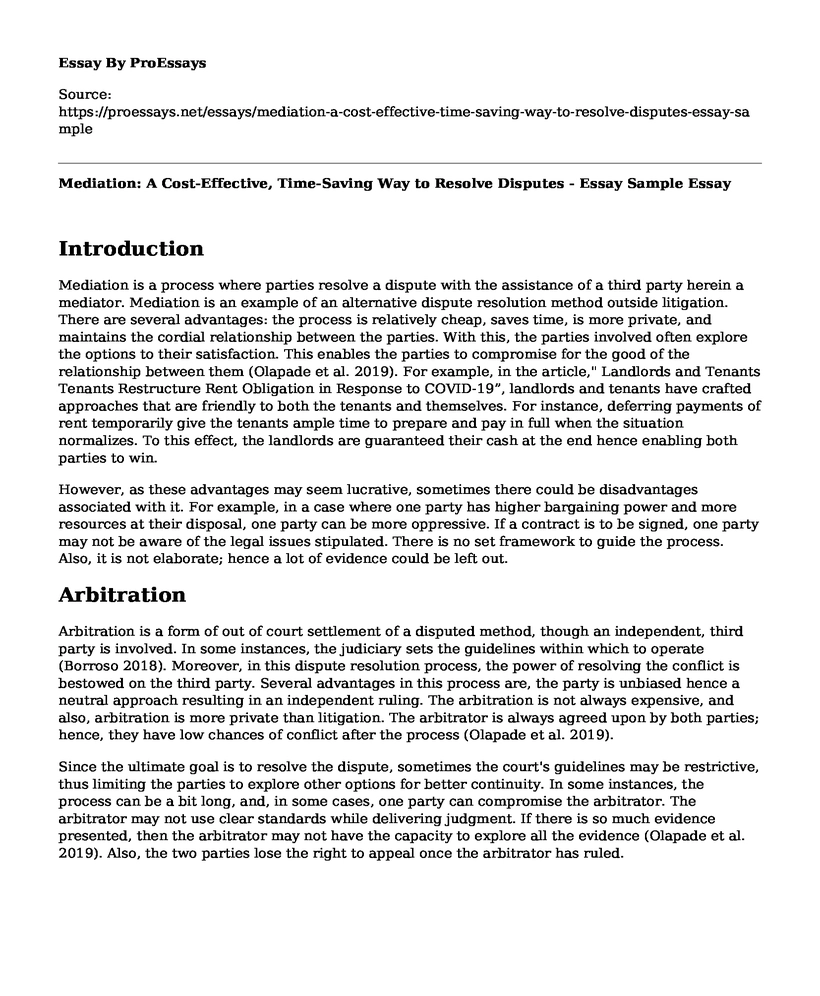Introduction
Mediation is a process where parties resolve a dispute with the assistance of a third party herein a mediator. Mediation is an example of an alternative dispute resolution method outside litigation. There are several advantages: the process is relatively cheap, saves time, is more private, and maintains the cordial relationship between the parties. With this, the parties involved often explore the options to their satisfaction. This enables the parties to compromise for the good of the relationship between them (Olapade et al. 2019). For example, in the article," Landlords and Tenants Tenants Restructure Rent Obligation in Response to COVID-19”, landlords and tenants have crafted approaches that are friendly to both the tenants and themselves. For instance, deferring payments of rent temporarily give the tenants ample time to prepare and pay in full when the situation normalizes. To this effect, the landlords are guaranteed their cash at the end hence enabling both parties to win.
However, as these advantages may seem lucrative, sometimes there could be disadvantages associated with it. For example, in a case where one party has higher bargaining power and more resources at their disposal, one party can be more oppressive. If a contract is to be signed, one party may not be aware of the legal issues stipulated. There is no set framework to guide the process. Also, it is not elaborate; hence a lot of evidence could be left out.
Arbitration
Arbitration is a form of out of court settlement of a disputed method, though an independent, third party is involved. In some instances, the judiciary sets the guidelines within which to operate (Borroso 2018). Moreover, in this dispute resolution process, the power of resolving the conflict is bestowed on the third party. Several advantages in this process are, the party is unbiased hence a neutral approach resulting in an independent ruling. The arbitration is not always expensive, and also, arbitration is more private than litigation. The arbitrator is always agreed upon by both parties; hence, they have low chances of conflict after the process (Olapade et al. 2019).
Since the ultimate goal is to resolve the dispute, sometimes the court's guidelines may be restrictive, thus limiting the parties to explore other options for better continuity. In some instances, the process can be a bit long, and, in some cases, one party can compromise the arbitrator. The arbitrator may not use clear standards while delivering judgment. If there is so much evidence presented, then the arbitrator may not have the capacity to explore all the evidence (Olapade et al. 2019). Also, the two parties lose the right to appeal once the arbitrator has ruled.
Litigation
Litigation is a process where a dispute is heard and resolved in a court of law. The parties involved are judges, lawyers, and the complainant, and the respondent. Litigations assists in cases where there is a civil right violation dispute or a lawsuit where one of the parties involved is vulnerable and may not get a satisfactory judgment in the alternative dispute resolution, ADR. In litigation, the arbitrator enlightens the parties of their rights. Also and the judges consider the pieces of evidence adduced in court under the state laws in passing judgment.
However, as it may be so, this process is time-consuming, requires resources that some people may not be able to afford, and the outcome can permanently ruin the relationship between the two parties involved (Barroso 2018). For example, in Modell's case, the court is not working to its full capacity due to the COVID-19 pandemic; thus, it takes a longer time. The ruling that rent is not an essential service has left the landlord disgruntled; the employees have lost since they are not represented in the case by anyone. Moreover, the judge has not addressed the tax obligation payments for resolving the dispute.
In my opinion, I can advise Wayne to resort to mediation. I can offer to mediate since the relationship between Wayne and Clark should continue while the business is picking up again. Also, the cordial relationship between them maintained. The two parties can consider options like reducing the space of operation to enable Clark to pay less rent or the landlord can reduce the rent for a certain period then the amount paid in a lump sum when the company is stable.
Works Cited
Barroso, Chloé. "Landlord-Tenant Disputes: Towards the End of Court Litigation through Alternatives." (2018). https://pmworldlibrary.net/wp-content/uploads/2018/04/pmwj69-Apr2018-Barroso-landlord-tenant-disputes-student-paper.pdf
Olapade, Daramola Thompson, Biodun Olapade, and Bioye Tajudeen Aluko. "Premises recovery through the adoption of alternative dispute resolution (ADR) techniques." Journal of Property, Planning, and Environmental Law (2019). https://www.emerald.com/insight/content/doi/10.1108/JPPEL-06-2018-0015/full/html
Cite this page
Mediation: A Cost-Effective, Time-Saving Way to Resolve Disputes - Essay Sample. (2023, Aug 09). Retrieved from https://proessays.net/essays/mediation-a-cost-effective-time-saving-way-to-resolve-disputes-essay-sample
If you are the original author of this essay and no longer wish to have it published on the ProEssays website, please click below to request its removal:
- Why Does Empire Need Both Corruption and Generation? Essay Example
- The Solution for Overcoming Barriers of Green Road Construction in Developing Countries - Essay Sample
- Essay Example on Two-Party System: Pros & Cons & Impact on Voter Turnout
- Essay Sample on Restoring Democracy: A Change for the Better in Our Country
- Essay on Addressing Social Factors Affecting Population Health: The Need for Policy Advocacy
- Essay Sample on Exploring Marxist Theory in William Shakespeare's Othello
- Essay on Exploring Imperialism, Sex, and Science: Author's Purpose in Book on U.S. Policy in Puerto Rico







